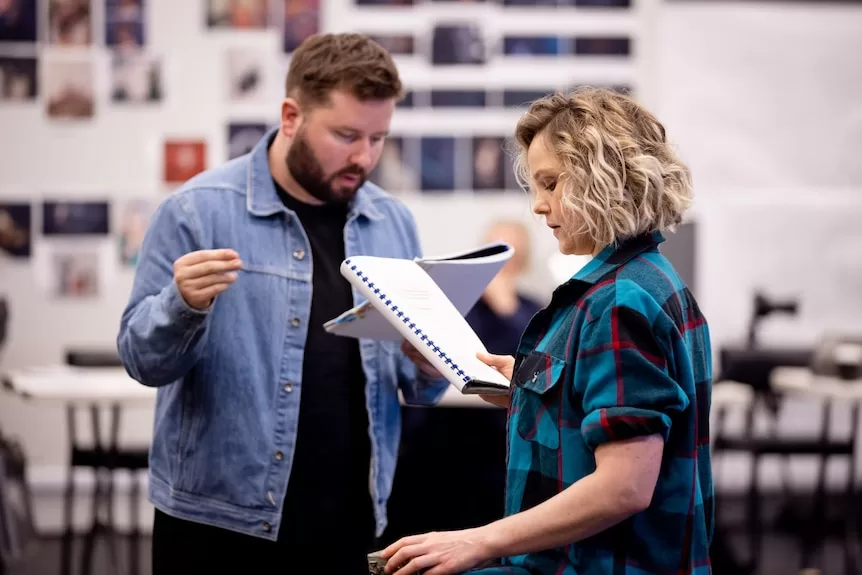Award-winning artistic director Kip Williams has resigned from the Sydney Theatre Company (STC) after eight years at the helm.
His resignation on Friday comes more than a year before his tenure was due to end, at the end of 2025.
He will continue as artistic director until the end of the year, announcing his final season for the company in September.
In a statement, Williams described his tenure at STC as “the honour of a lifetime”.
“Over the past eight years, I have had the opportunity to work with the most extraordinary theatre makers in the country and have been fortunate enough to program and help bring to life 89 productions for STC,” he said.
“When I started as artistic director, one of my goals was to increase the space and opportunity for Australian stories on our stages. I couldn’t be prouder that two-thirds of the shows I have programmed during my tenure have been original works and adaptations by Australian writers.”
He thanked the company’s staff and the artists with whom he had worked in the past.
“I look forward to returning as an artist to the company I love so much in the years ahead and thank everyone in the STC family for your support and passion for the theatre we make together,” he added.
When he was appointed in 2016, he became the youngest-ever artistic director of STC, at just 30 years old.
He has since overseen several success stories for the company, including a one-woman show about Ruth Bader Ginsburg, RBG, starring Heather Mitchell, currently on tour around Australia, and his “cine-theatre” production of The Picture of Dorian Gray touring to London’s West End, with Succession star Sarah Snook in the title role. (Snook is nominated for an Olivier Award for the role, with the season closing in May.)
For the original production, starring Eryn Jean Norvill, Williams won best production and best director at both the Sydney Theatre Awards and the Green Room Awards.
Williams told the Sydney Morning Herald that he was leaving STC as Dorian Gray would be touring to Broadway next year, and he felt he wouldn’t be able to juggle the production with programming the 2026 season.
“It became quite clear to me that the responsibility of programming 2026 would be too great with that time away. It’s been a really big decision given how long I’ve been with the company and what the company means to me,” he said.
Williams started working with STC in 2011 as an assistant director on Andrew Upton’s adaptation of Mikhail Bulgakov’s The White Guard, shortly after his graduation from the National Institute of Dramatic Arts in 2010. He was appointed by then-artistic directors Upton and Cate Blanchett as an associate director in 2012, rising to resident director in 2013.
He made his main stage directorial debut in 2012, at just 25 years old, directing Jack Thompson in Dylan Thomas’s Under Milk Wood. He took on the role of artistic director after British theatre director Jonathan Church left the top job after only six months.
His next project with STC will be a one-woman “cine-theatre” take on Dracula, starring Zahra Newman (The Hate Race), which opens in Sydney in July, before touring Australia next year. He will also direct another production in the 2025 season.
STC chair Ann Johnson praised Williams’s “skill, resilience, and creativity”, crediting him for leading the company through the redevelopment of its Wharf theatres and the COVID-19 pandemic, and for his work nurturing emerging artists.
“Kip has put great focus on Australian writing, championing new voices, and has realised his goal of gender parity for women writers and directors across every season,” she said.
STC executive director and co-CEO Anne Dunn described Williams as “an extraordinary artist and a visionary artistic director”.
“He will leave a legacy of initiatives which support new works and artist development and a company at the forefront of presenting Australian theatrical works of scale.”
Williams’s departure comes at a time of flux at the company: It was reported last week that seven roles in administration and operations have been tapped for redundancy as the company struggles with budget pressures. This comes following the end of government COVID emergency funding and the loss of several philanthropic donors, who withdrew their support after three actors wore Palestinian keffiyehs at the curtain call for the opening of The Seagull.
Speaking to SMH, Williams denied that financial pressures played a role in his departure. He also did not comment on suggestions that he might be recruited by a London theatre company like the Young Vic.
Williams’s resignation is the second from an artistic director of a state theatre company in the last month after Queensland Theatre artistic director Lee Lewis announced her departure in mid-March. At the time, she wrote: “I feel it is in the best interests of the Company for new energy to inspire artists and audiences alike.”
